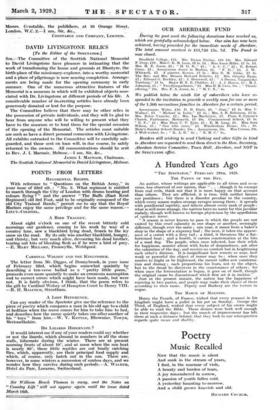POINTS FROM LETTERS
REGIMENTAL RIGHTS.
With reference to " Questions on the British Army," in your issue of 23rd ult. : " No. 3. What regiment is entitled to march through the City of London with drums beating and colours flying ? ' and the answer " The Buffs (East Kent Regiment) old 3rd Foot, said to be originally composed of the old City Trained Bands," permit me to say that the Royal Marines enjoy the same privilege and for the same reason:- LiEtrr.-CoLoNEL.
A BIRD TRAGEDY.
About eight o'clock on one of the recent bitterly cold mornings our gardener, coming to his work by way of a country lane, saw a blackbird lying dead, frozen to the icy snow on the road. By its side was another blackbird, hungry, and thirsty, but very much alive, devouring his .dead brother, tearing 'out bits of bleeding flesh as if he were a bird of prey. -E. 'MARY MIL:LARD; FronwYlfa, Welshpool. - CARDINAL VS OLSEY AND THE KINGFISHER.
The letter from Mr. Digges, of Donnybrook, in your issue of February 23rd, which begins somewhat quaintly by describing a ten-verse ballad as a " pretty little poem,' proceeds even more quaintly to make an erroneous assumption and to correct errors which might have been made, but were not. It is fairly obvious, I think, that the poem refers to the gift by Cardinal Wolsey of Hampton Court to Henry VIII. -R. H. MALCOLM, Streatham.
A LOST REFERENCE.
Can any reader of the Spectator give me the reference to the piece of poetry which compares a man in his old age to a child at-bedtime when the nurse comes for him to take him to bed, and describes how the nurse quietly takes one after another of his " toys " from him.-W. V. KETTLE, Rhowniar, Towyn, Merionethshire.
Do LIZARDS HIBERNATE ?
It would interest me if any of your readers could say whether or not the lizards, which abound in numbers in all the stone walls, hibernate during the winter. There are at present morning frosts of about 10°, and at noon when the sun heat is nearly 80°, these little reptiles are out busily catching flies, which, apparently, are their principal food supply and which, of course, only hatch out in the sun. There are, however, in some winters a succession of sunless days, and we wonder how they survive during such periods.-A. WALKER, Hotel du Parc, Locarno, Switzerland.
























































 Previous page
Previous page